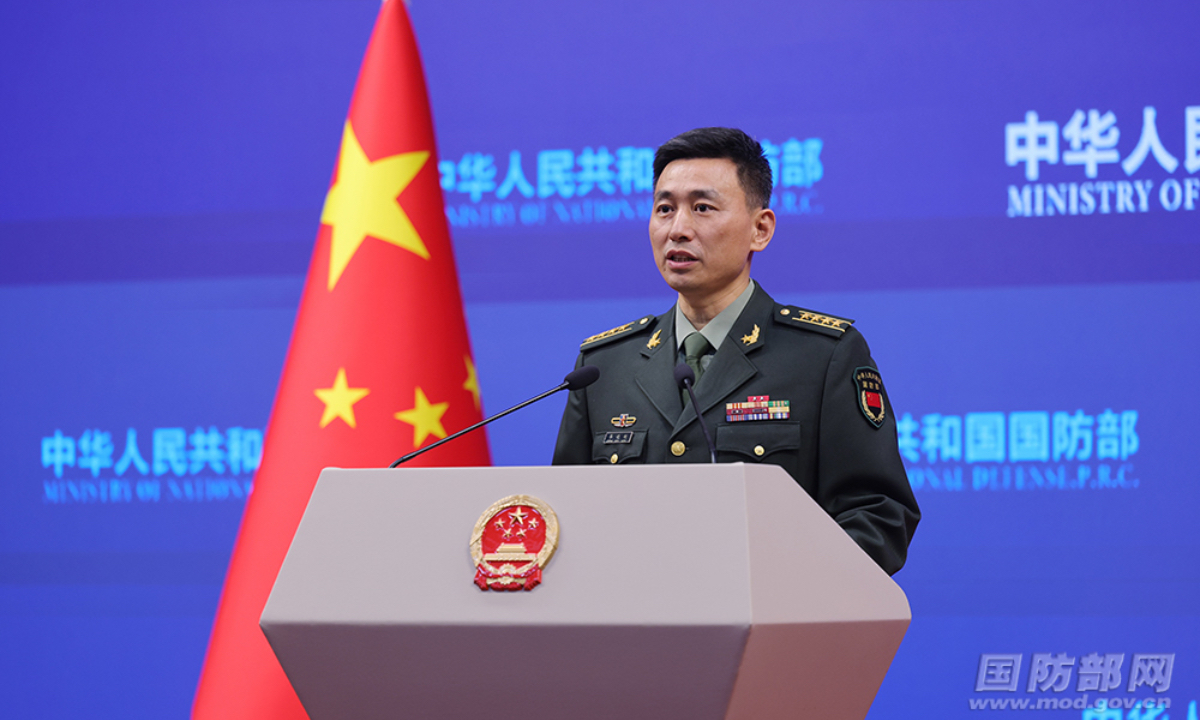
Zhang Xiaogang, spokesperson of China's Ministry of National Defense
Zhang Xiaogang, spokesperson of China's Ministry of National Defense, on Saturday criticized the US Department of Defense report titled "Military and Security development involving the PRC," saying the US has repeatedly published such highly deceptive and hypocritical reports for over 20 years, merely seeking excuses for its own military development and to mislead public opinion.
Zhang urged the US to stop fabricating false narratives, revise its misperceptions of China, and promote the healthy and stable development of bilateral relations and military ties.
In a report released on Wednesday local time, the Pentagon emphasized "the need to address the pacing challenge" presented by China's increasingly capable military.
It also exaggerated China's nuclear weapons development, saying the Pentagon estimates that China has surpassed 600 operational nuclear warheads as of mid-2024 and projects it will exceed 1,000 by 2030.
It claimed that Beijing "may also be exploring development of conventionally-armed intercontinental range missile systems" and "if developed and fielded, such capabilities would enable the PRC to threaten conventional strikes against targets in the continental US, Hawaii, and Alaska."
In a statement published by China's Ministry of National Defense on Saturday, Zhang expressed strong dissatisfaction and resolute opposition to the US report, said it distorted China's defense policy, speculated on China's military development, and blatantly interfered in China's internal affairs, and propagated baseless rumors and slander against the Chinese military, as well as exaggerated and sensationalized rhetoric regarding the so-called "Chinese military threat."
China is committed to a path of peaceful development, adhering to a defensive national defense policy. It actively fulfills the international responsibilities shouldered by a major power's military, taking concrete actions to implement the Global Security Initiative and the concept of a community with a shared future for mankind, offering greater public security contributions to the international community, said Zhang.
In contrast, the US utilizes its military advantages to maintain unilateral hegemony, forcibly promotes "regime changes," incites "color revolutions," and frequently resorts to extreme pressure. In recent years, it has illegally waged wars and military actions against countries such as Iraq, Syria, and Afghanistan, resulting in severe civilian casualties and property losses, leading to immense humanitarian disasters, with hundreds of thousands dead, millions injured, and tens of millions displaced. The facts demonstrate that the US military strategy has increasingly become confrontational, aggressive, and reckless. The war-hungry US has become the greatest disruptor of the international order and the biggest threat to global security, Zhang noted.
Zhang said China's nuclear policy reflects unparalleled stability, continuity, and predictability among all nuclear-armed states. "We adhere to a nuclear strategy of self-defense and a no-first-use policy, ensuring that our nuclear capabilities remain at the minimum level required for national security. Our development of nuclear weapons is not intended to threaten other countries, but rather for defense and self-protection, to safeguard our strategic security."
In contrast, the US possesses the world's largest and most advanced nuclear arsenal, yet stubbornly insists on a policy of first use of nuclear weapons. It invests heavily in upgrading its nuclear triad forces and has conducted numerous subcritical nuclear tests in recent years, accelerating the development of new nuclear warheads.
The AUKUS nuclear submarine cooperation severely undermines the international nuclear non-proliferation system and significantly disrupts international and regional peace and stability. The US should engage in serious self-reflection, reduce the role of nuclear weapons in its national and collective security policies, and provide the international community with a responsible account, said Zhang.
The Taiwan question is China's domestic affairs, and it is the core of China's core interests. It is the first red line in China-US relations that cannot be crossed. The Chinese people are determined to defend national sovereignty and territorial integrity, Zhang said.
No matter when or who attempts to separate island of Taiwan from China, the Chinese people and the Chinese military will never agree to it. The Chinese military conducts exercises in the air and sea around Taiwan island specifically to address external interference and provocations from "Taiwan secessionist" forces. This is a necessary and just action to defend sovereignty and territorial integrity, said Zhang.
The US is intensifying military ties with Taiwan, accelerating the arming of island of Taiwan through arms sales and military aid, which seriously violates the one-China principle. This will only fuel the arrogance of "Taiwan secessionism" and escalate tensions in the Taiwan Straits, potentially leading to conflict and war, Zhang said.
China urges the US to adhere to the one-China principle and the provisions of the three China-US joint communiques, to recognize the extreme danger of "Taiwan independence" separatism, to understand the serious consequences of playing with fire, to stop official exchanges and military contacts with island of Taiwan, and to cease condoning and supporting "Taiwan independence" separatist forces. The US should not continue down the wrong path, Zhang noted.
Zhang said military relations form a crucial part of the broader China-US relationship. We attach great importance to the military relationship and ensure open and effective communication with the US via military diplomatic channels.
We hope that the US will engage constructively with China, embrace a constructive and balanced perspective on China's growth and military modernization, and adhere to the principles of peace, stability, and mutual trust, said Zhang, noting that China aims to build a military relationship based on equality and respect, characterized by no conflict or confrontation, open and pragmatic cooperation, and gradually accumulating mutual trust, thereby serving as a stable foundation for the development of bilateral relations.
For over 20 years, the US has pieced together and repeatedly published such highly deceptive and hypocritical reports, merely seeking excuses for its own military development and misleading public opinion.
Zhang urged the US to stop fabricating false narratives, correct its erroneous perceptions of China, and promote the healthy and stable development of the relationship between two countries and militaries.
Global Times




